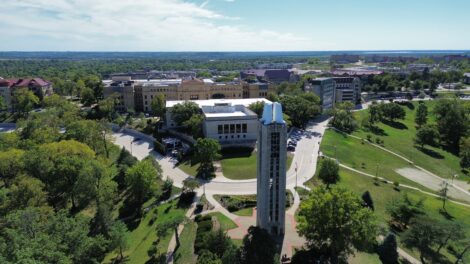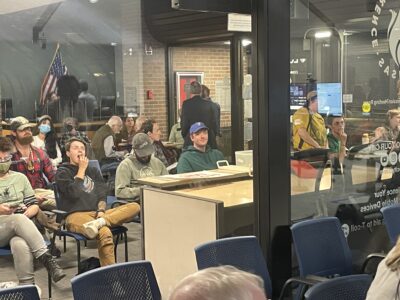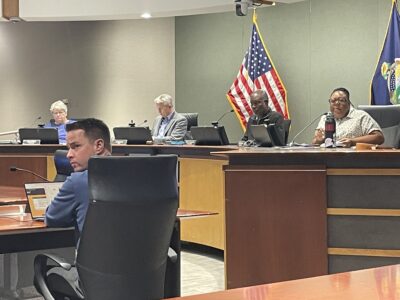In health care, child care, research and more, Douglas County organizations try to maintain business as usual despite threats to federal funding

photo by: Shawn Valverde/Special to the Journal-World
The University of Kansas campus is pictured in this aerial photo from September 2023 with the Campanile in the foreground.
Federal funds could help improve Lawrence’s sidewalks and transit infrastructure. They provide child care for Douglas County’s low-income families. And, of course, they fuel many important research projects at the University of Kansas.
But a flurry of moves from the Trump administration regarding federal funding — including a proposed funding freeze and many other executive orders — are creating uncertainty about future plans for governments, nonprofits and KU.
A memo from the Office of Management and Budget on the night of Jan. 27 called for the temporary pause “of all Federal financial assistance” to any programs that might be affected by President Donald Trump’s executive orders, including but not limited to “financial assistance for foreign aid, nongovernmental organizations, DEI, woke gender ideology, and the green new deal.” A federal judge blocked the freeze the next day, but the threat to pause $3 trillion in federal funding shook up organizations and governments across the country.
KU, local governments and nonprofits told the Journal-World that they are trying to keep things as normal as possible, even if they aren’t sure what may happen next. And in Douglas County, this is a question with hundreds of millions of dollars at stake.
USAspending.gov, a database that provides an overview of federal spending, reported that there were $754.3 million worth of federal grant obligations in Douglas County during the 2024 fiscal year. About $486.9 million of that came from the Social Security Administration, whose obligations would not have been subject to a funding freeze, but that still would leave more than $267 million. And grants aren’t the only kinds of federal money coming into Douglas County — there are also federal contracts for work being done at KU, for instance.
• • •
Like other large research institutions across the country, a significant chunk of the University of Kansas’ budget comes from federal funding.
Last year, about a quarter of KU’s operating revenues came from federal grants and contracts — nearly $290 million, according to Erinn Barcomb-Peterson, the director for news and media relations for KU. And it also received about $90.5 million in “non-operating” revenues, or money for things other than the university’s usual operating expenses.
Many of the federal grants to KU are for research and come from the Department of Education and the Department of Health and Human Services, according to USAspending.gov. In fact, the largest grant awarded in Douglas County during the most recent fiscal year was awarded to KU by HHS: around $22 million for biomedical research.
In January, the National Institutes of Health, a part of the Department of Health and Human Services, canceled its grant review meetings with researchers across the country. And although the process of grant reviews has started back up since then — albeit, as Science reported, mostly for “reviews of grants that don’t obviously contradict the executive orders” from Trump — the canceled meetings created fears and uncertainty at some universities, including the University of Wisconsin.
Barcomb-Peterson said KU would be taking the potential impacts to federal funding “one day at a time.”
She said the university was continuously monitoring any updates from Washington, the courts and within the KU and national research communities and was ensuring that KU’s scholars “are supported and there is as little disruption as possible.”
Barcomb-Peterson said the university has told its researchers that their work is still valuable, and that they should keep working on projects “unless and until they receive a stop work order” from their funding agency.
“KU’s research endeavors fuel the state economy and ensure our students are the top talent choice for the state’s workforce,” Barcomb-Peterson said.
• • •
The Douglas County government received $624,735 in federal funds in 2023, according to Karrey Britt, Douglas County’s communications and media coordinator. She said most of that funding supported services under Emergency Management, the District Attorney’s Office and the Sheriff’s Office.
Robert Bieniecki, the director for Douglas County Emergency Management, said that in 2024, his department received two federal grants: a Hazardous Materials Emergency Preparedness (HMEP) grant for $30,000 from the Department of Transportation and an Emergency Management Performance Grant (EMPG) worth $102,675 from FEMA. All those grants passed through the Kansas Department of Emergency Management and have a 20% local match, Bieniecki said.
Bieniecki said the HMEP funded an emergency preparedness exercise, while the EMPG helps the department fund 1.5 full-time employees. Although the department received another HMEP grant for 2025 for a $11,900 lithium-ion battery response training, Bieniecki said the department did not know if it would get an EMPG for 2025.
Amid the uncertainty, Britt said the county’s budget and finance department is “staying apprised of the evolving situation.”
The City of Lawrence’s government is facing a similar prospect of uncertainty. Rachelle Mathews, the city’s finance director, said the city’s understanding is that federal agencies are taking steps to “examine their respective programs and policies based on the new administration’s goals”; how those evaluations will impact local governments is “yet to be determined.”
In the past few months, the city has approved projects that would rely on federal grants as part of the funding. The new $2 million downtown transit station, for which a site in the 700 block of Vermont Street was selected in December, would rely on about $1,624,000 in federal funds, according to a city presentation on the project.
Additionally, the city approved an application for a federal Rebuilding American Infrastructure with Sustainability and Equity (RAISE) grant that could award up to $21 million for the construction of new pedestrian crossings for transit stops, building new sidewalks where there are currently gaps and reconstructing sidewalks and building bus stops that will meet ADA requirements.
While the city does not know how those specific projects could be affected, Mathews said the city is receiving updates from groups like the International City/County Management Association and the Government Finance Officers Association as things “unfold at the federal level.”
• • •
For nonprofits that rely on federal funds, the situation is still uncertain.
Julie Branstrom, the CEO of the Heartland Community Health Center, said the center was initially impacted by the move. It was briefly unable to access federal grant funds right after the freeze was announced, but after the judge blocked the freeze, Branstrom said the center was able to draw down the funds, which “are essential for providing affordable health care in Douglas County.”
She said the center does not anticipate any disruptions in services because Heartland has enough cash reserves to cover any temporary gaps. But if the freeze is implemented again or federal funding changes, “there could be future impacts to the health center,” Branstrom said.
Shannon Oury, the CEO for the Lawrence-Douglas County Housing Authority, said her organization similarly was unable to draw down funds on Jan. 28. Although the LDCHA was able to get access to them again the following day, and Oury received assurance that federal funds for rental assistance would still be provided, the housing authority has not received any updates from the federal government on what might happen to the public housing subsidies and voucher rental assistance the organization provides.
Oury said the LDCHA will still continue to help people with housing resources, and the organization has enough reserve funds to last for several months. But she is still monitoring the changes happening at the federal level.
“It is a dynamic situation,” Oury said.
In some parts of the country, the issues in accessing funds also affected Head Start, a federally funded program that provides preschool for low-income children and support services for their families. The Milwaukee Journal-Sentinel reported that as of Thursday, six of the 39 Head Start centers in Wisconsin could not access funds and were struggling to stay open.
Crystal Anderson is the CEO of ECKAN, which helps administer Head Start programs across 12 locations in eastern Kansas, including Douglas County. Although she said the payment system was down a bit two weeks ago, ECKAN did not have “any issues or delay with our payments.”
Anderson said the rescinding of the pause of federal funding was “paramount” for the organization to continue to operate. While Anderson noted the situation is fluid and the organization is keeping “a close eye” on updates at the state and federal level, she, like other nonprofit leaders, stressed that her organization was still working to provide the necessary services.
“ECKAN is functioning normally and providing critical services to our Head Start and Early Head Start families,” Anderson said.







